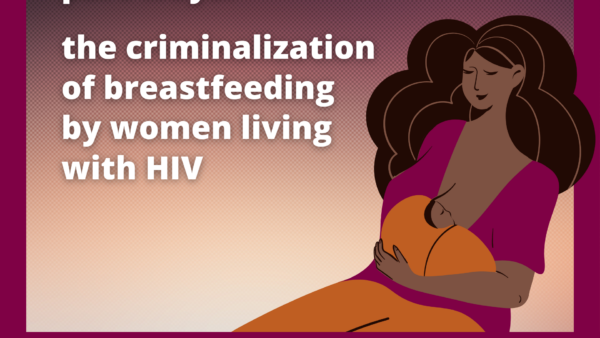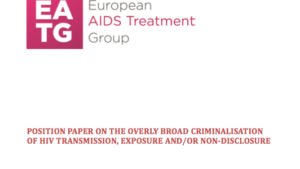Overview
There are no HIV-specific criminal laws in Austria, however since 1990 existing disease laws have been used to prosecute cases of HIV ‘exposure’.
The Criminal Code makes it a crime to intentionally (section 178) or negligently (section 179) commit an act which is likely to cause a communicable disease to spread. Under the law, the disease must be (at least in part) reportable or notifiable. HIV is considered such an infectious disease, along with Hepatitis C, tuberculosis and gonorrhoea.
An ‘act’ capable of causing danger includes sexual activity such as vaginal or anal intercourse, oral sex or heavy kissing where there is biting or open wounds. An ‘act’ could also include the sharing of injecting equipment. The fact that the provisions require only an act likely to cause the spread of a communicable disease demonstrate that mere ‘exposure’ is sufficient for prosecution in HIV cases. Disclosure to and the consent of a sexual partner do not vitiate liability under the law.
If the act is carried out with the intent of spreading the disease, then the penalty is a maximum three years’ imprisonment or a fine. If it is an act of negligence, then the penalty is a maximum of one year imprisonment or a fine.
General harm provisions can also be used to prosecute cases of HIV ‘exposure’ or transmission. For instance, section 85 imposes enhanced penalties for bodily injury where these result in illnesses.
At least 56 people living with HIV in Austria have been prosecuted, and at least 30 convicted. Data provided by AIDS-Hilfen Österreich and documented in AIDS Action Europe’s 2023 report, HIV Criminalisation in the EU, suggests that sections 178 and 179 laws are more commonly enforced against people living with other diseases; between 2005-2009 there were 52 prosecutions under section 178 and eight under section 179, 15 and three were against people living with HIV, respectively, with the remainder against people living with other diseases.
Several court cases have narrowed the scope of criminalisation based on HIV transmission risks.
In 1997, the Supreme Court held that vaginal intercourse with a condom and ‘deep kisses’ do not constitute an offence since both can lead to transmission of HIV only in particular circumstances (as i.e. wounds in the mouth, bites etc).
In 2003, the Upper Regional Court of Graz (on appeal) – relating to the 1997 Supreme Court decision – held that it is no offence if an HIV-positive man has oral sex with an HIV-negative man without ejaculation into the mouth (Oberlandesgericht Graz 27.03.2003, 11 Bs 105/03).
Since the publication of a paper by the Austrian AIDS Foundation in 2005, critiquing cases of prosecutions for oral sex and sex with condoms, it appears that the legal arguments have focused on the individual level of risk during unprotected sex, focusing on viral load. In all known cases involving undetectable viral load (or just blips) the prosecutors have either dropped the case or the courts have acquitted.
In December 2019, however, the Regional Court of Klagenfurt sentenced a 45-year-old man to eight months’ imprisonment (on probation) for having insertive vaginal and anal intercourse with a woman and a man (on separate accounts) without using a condom despite the fact that the man had a history of years of undetectable viral load and had been advised by his doctors that he was not infectious and need not use condoms to prevent HIV transmission (Landesgericht Klagenfurt 11.12.2019, 12 Hv 16/19w). His partners were not infected. The court relied on an expert opinion saying that – despite undetectable viral load – an infection still would be possible if the viral load would raise (and fall again) within the three-month control periods. The AIDS Action Europe 2023 report cited above notes that a court of second instance overturned a conviction fitting the circumstances of this case, in line with court practice in recent years.
Austria’s AIDS Act (Aids-Gesetz) also prohibits people living with HIV from undertaking sex work and sex workers are required to undergo HIV tests every three months or face a fine of up to €7,260.
In November 2021, an alliance of Austrian HIV/AIDS organisations published a position paper calling for the destigmatisation of HIV in the criminal law. They stressed that people living with HIV who regularly take medication and whose viral load is below the detectability limit ‘do not pose a threat’, and that the use of condoms and effective treatment should formally exclude the possibility of criminal prosecution. It is suggested that their demands have broad support from Austrian political parties, and are currently being examined by the Ministry of Justice, however these proposals have not yet come into force.
Laws
Criminal Code
Section 178. Intentional endangerment of people by communicable diseases
Anyone who commits an act that is suitable to bring about the risk of spreading a communicable disease among people is to be punished with a prison sentence of up to three years if the disease is one of the diseases that must be reported or not reported, albeit only limited.
Section 179. Negligent endangerment of people by communicable diseases
Anyone who negligently commits the act threatened with punishment in § 178 is to be punished with imprisonment for up to one year or with a fine of up to 720 daily rates.
Criminal Code
Section 85
(1) Who abuses another on the body and thereby negligently for always or for a long time
1. the loss or serious damage to speech, vision, hearing or reproductive ability,
2. a significant mutilation or a striking disfigurement,
2a. a mutilation or other injury to the genitals that is likely to cause a lasting impairment of sexual sensation, or
3. a serious suffering, illness or occupational disability of the injured party,
is to be punished with imprisonment from six months to five years.
(2) A prison sentence of one to ten years shall be imposed on anyone who injures another’s body or damages his health and thereby, even if only negligently, causes a serious permanent consequence (para. 1) in the injured person.
Further resources
A guidebook, in German only, published by AIDS-Hilfe Austria on Laws, HIV and AIDS, published in 2013.
Austria’s Aidshilfen protest against discrimination of people with HIV in court and demand “the destigmatization of HIV-positive people in criminal law”. The support organisations state that HIV infection should no longer be covered by the criminal liability of Paragraph 178f. As long as this remains the case, “the current state of medical research must be taken into account when a court makes a decision. This means that both safer sex and the consistent use of drug therapy must be considered grounds for exclusion from proceedings.”
Acknowledgements
We thank RA Dr Helmut Graupner, Attorney-at-law, Vienna for providing editorial input to this page.
Our thanks also to Australian law firm Hall & Willcox for their research assistance to confirm current relevant legislation.
HIV Justice Network's Positive Destinations
Visit the Austria page on Positive Destinations for information on regulations that restrict entry, stay, and residency based on HIV-positive status, as well as access to HIV treatment for non-nationals.









